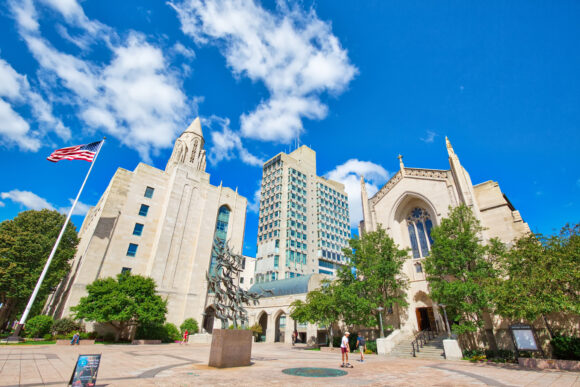A federal court has rejected a proposed class action by students against Boston University over alleged damages they suffered due to cutbacks by the school during the Covid-19 pandemic.
The students sought a refund of payments they made for tuition and fees for the loss of “on-campus experience” when the school closed its campus, halted all in-person instruction, and moved all classes online in the spring of 2020.
The federal district court for Massachusetts said that BU provided in-person instruction in exchange for tuition and access to certain campus facilities in exchange for certain fees but the school never made an “open-ended” promise to provide an “on-campus experience” as claimed by the students.
The court found fault with their expert’s methodology for calculating the damages they allegedly suffered.
The court noted that the contractual obligations to provide in-person instruction and access to on-campus facilities arose from different sources and any appropriate measure of damages would require separately addressing each alleged promise. This would involve measuring the net reduction in the value of tuition associated with the transition to online instruction and giving different consideration to the net reduction in the value of campus fees associated with the loss of access to campus facilities. However, the students attempted to identify a value for the “experience” that was dissociated from the nominal costs of each component.
As part of its defense, BU cited the doctrine of “impossibility” and the court agreed that no jury could find that students reasonably believed that BU “undertook an absolute obligation to perform” according to the alleged contract and assumed the risk even if continued performance became unlawful.
The doctrine of impossibility – or impracticability – excuses performance of a contract where an event that occurs after the contract is executed makes performance impossible or impracticable; a basic assumption behind the contract was nonoccurrence of the event; and the party seeking to have its performance excused did not cause the event.
The plaintiffs argued that nonoccurrence of the event was a basic assumption on which the BU contract rested, arguing that there was a genuine dispute of material fact as to whether BU assumed the risk of a pandemic. However, the court found that argument unconvincing, noting that even the plaintiffs conceded that “Covid’s effects were unforeseen.”
BU may have to still provide restitution for the difference in value between what students were promised and what they received, the court continued. However, the methodology used by the plaintiffs’ expert, known as the Choice-Based Conjoint (CBC) Analysis, is inappropriate for the calculation of damages for the type of breach alleged in this case, the court concluded. Because this expert testimony was insufficient to create a genuine dispute of material fact as to the existence or amount of any restitution damages — and the plaintiffs offered no other opinion on how to adequately measure damages — the court granted summary judgment in BU’s favor.
Photo: Boston University Campus Entrance.
Topics Lawsuits Education Universities
Was this article valuable?
Here are more articles you may enjoy.



 Preparing for an AI Native Future
Preparing for an AI Native Future  Judge Awards Applied Systems Preliminary Injunction Against Comulate
Judge Awards Applied Systems Preliminary Injunction Against Comulate  Florida Insurance Costs 14.5% Lower Than Without Reforms, Report Finds
Florida Insurance Costs 14.5% Lower Than Without Reforms, Report Finds  Judge Tosses Buffalo Wild Wings Lawsuit That Has ‘No Meat on Its Bones’
Judge Tosses Buffalo Wild Wings Lawsuit That Has ‘No Meat on Its Bones’ 

